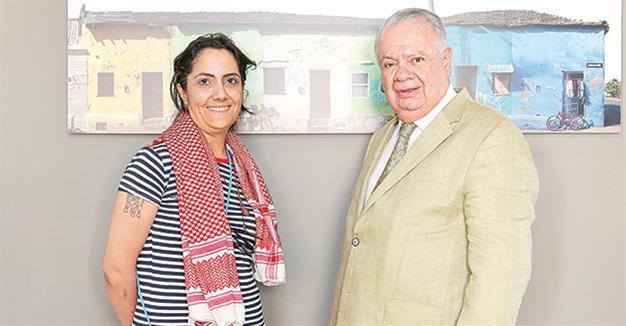Colombian envoy ‘optimistic’ about imminent deal with rebel group
Emine Kart - ANKARA

HÜRRİYET photo / Rıza Özel
Columbia’s ambassador to Turkey has expressed high hopes for the eventual outcome of a peace deal being negotiated between his government and the Revolutionary Armed Forces of Colombia (FARC) rebels.“The conflict in Colombia with FARC, it [has been going on for] more or less 55 years,” the ambassador said in an exclusive interview with the Hürriyet Daily News.
Expressing strong hope that a peace deal would be signed between July 20 and Aug. 7, Ambassador Juan Alfredo Pinto also acknowledged that such a signing would be a “noteworthy coincidence if it happens because it would coincide with the time period between the two official national holidays of their country.”
In Colombia, July 20 is celebrated as Independence Day, while Aug. 7 is celebrated as the Battle of Boyacá Day.
Peace talks between the government and FARC have made significant progress since 2015. The two sides announced that an agreement had been reached on transitional justice and that a peace deal would be signed in 2016. The agreement appeared to fall short of international law standards on victims’ right to truth, justice and reparation, according to Amnesty International (AI).
By Dec. 1, 2015, AI’s Victims’ Unit had registered 7.8 million victims of the conflict, including almost 6.6 million victims of forced displacement, more than 45,000 enforced disappearances and around 263,000 conflict-related killings. The vast majority of the victims were civilians.
Pinto expressed conviction that a smaller insurgency group, the National Liberation Army (ELN), which was more ideological than FARC, was the most important group to deal with. Pinto said the group could number about 800 people.
“Now, we are optimistic. But we know that the signing [of] the peace [deal] in Colombia is not the beginning but it is a point of arrival,” Pinto said, remarking that they had to “organize a transition of justice.”
The ambassador said their government was “preparing to accept the participation of [FARC/ELN] militias and are preparing to accept [their] participation in politics in the parliament of Colombia.”
“We are ready. We are not afraid. Colombia is the eldest democracy in the America continent. Colombia is the only one country in Latin America that had 206 years of independence without any interruption of the constitutional order. The democracy is in our DNA,” he said.
“The civil conflict in Colombia is an example for many countries that need to understand that at the end of the day a political solution is the only real solution to the conflicts of nations,” he said.
FARC and the ELN were founded in the 1960s in the wake of a decade of political violence in Colombia known as la Violencia (1948–58). Excluded from a power-sharing agreement that ended the fighting, communist guerrillas took up arms against the government. FARC was composed of militant communists and peasant self-defense groups, while the ELN’s ranks were dominated by students, Catholic radicals and left-wing intellectuals who hoped to replicate Fidel Castro’s communist revolution in Cuba. The U.S. State Department has designated both groups as foreign terrorist organizations.
The peace deal being negotiated with FARC rebels will ultimately be determined by a referendum previously mooted by the Colombian government, the official leading negotiations with the insurgents said July 11.
“If the public says ‘No,’ the process stops and there will be no result,” Humberto de la Calle said in an interview with El Tiempo newspaper.
That would also mean “that we would have lost four years of our lives,” he said.
















